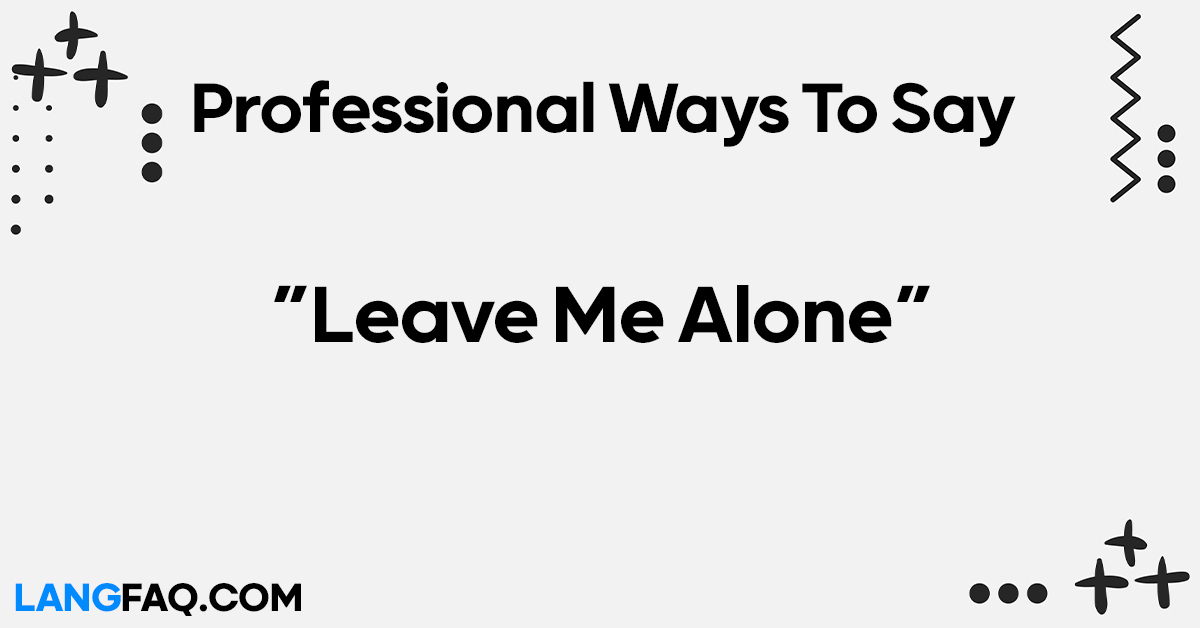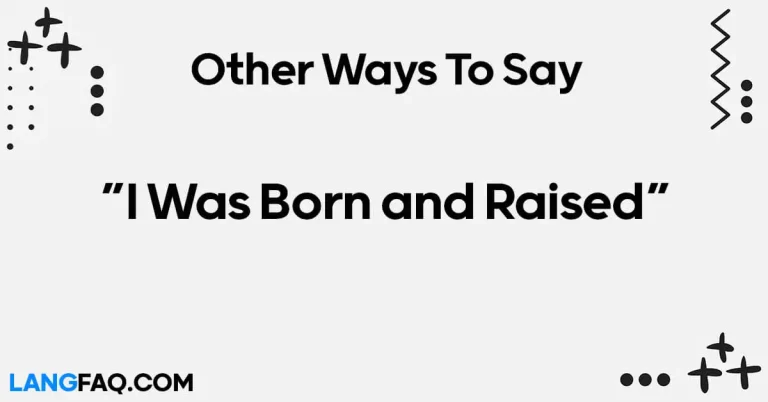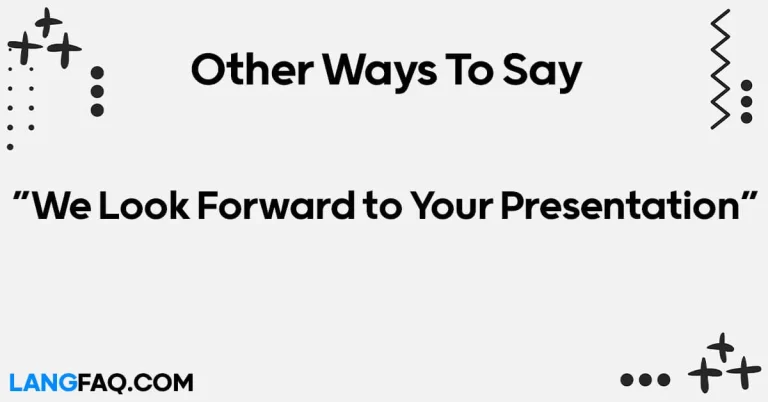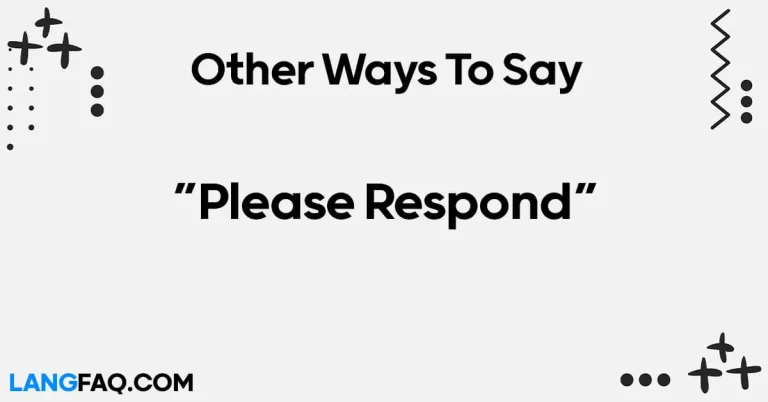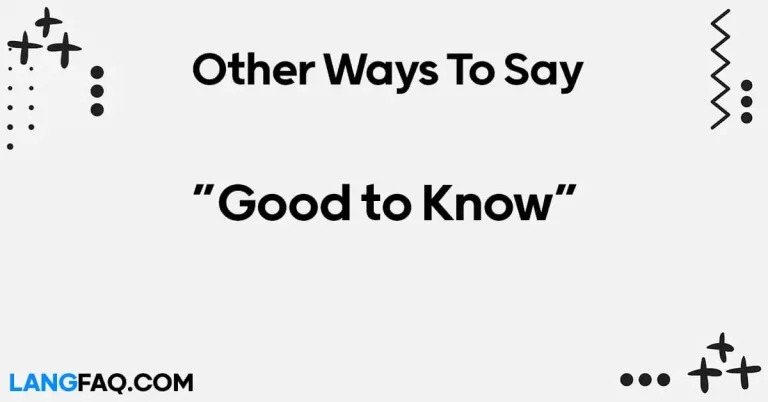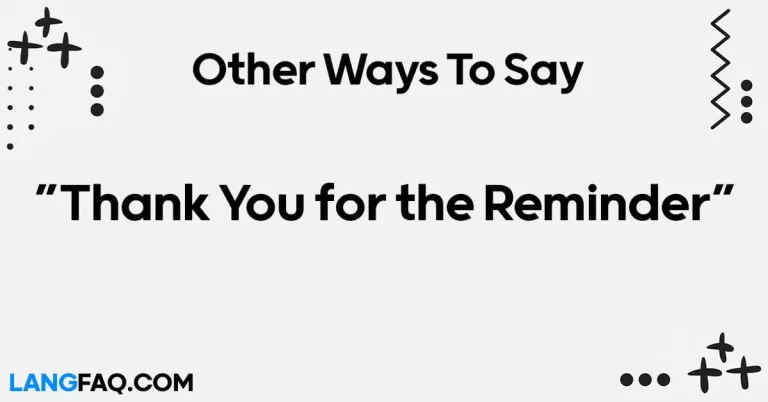In a world buzzing with constant connectivity, the ability to express the need for personal space is a crucial skill. Discovering 12 professional ways to say “Leave Me Alone” not only empowers individuals but also fosters healthy communication. This article delves into effective communication strategies, providing insights based on real-life experiences and expert advice.
12 Professional Ways to Say “Leave Me Alone”
Here are 12 professional ways to express the need for some space or solitude:
- I’m in need of some personal time, thank you.
- I appreciate your company, but I could use a bit of solitude right now.
- I hope you understand, but I need a moment to myself.
- I’m in a reflective mood and would prefer some alone time.
- I value our relationship, but I need some space at the moment.
- I’m working on a project and would appreciate some uninterrupted time.
- I need a brief break to recharge—your understanding is appreciated.
- I’m dealing with some personal thoughts and would like to be alone for a bit.
- I’m in the middle of something; can we catch up later?
- I’m embracing some quiet time right now; let’s talk soon.
- I’m taking a moment to focus, so I’d prefer not to be disturbed.
- I’m enjoying a bit of solitude; we can reconnect shortly.
Here’s a table with the meanings and examples of the 12 professional ways to say “Leave Me Alone”:
| Phrase | Meaning | Example |
|---|---|---|
| 1. I’m in need of some personal time, thank you. | Expressing the need for individual space. | “I appreciate your company, but right now, I’m in need of some personal time, thank you.” |
| 2. I appreciate your company, but I could use a bit of solitude right now. | Politely requesting some alone time. | “You’re great to be around, but I could use a bit of solitude right now, if that’s okay.” |
| 3. I hope you understand, but I need a moment to myself. | Seeking understanding for the need for solitude. | “I hope you understand, but I need a moment to myself to gather my thoughts.” |
| 4. I’m in a reflective mood and would prefer some alone time. | Indicating a desire for introspection. | “I’m in a reflective mood and would prefer some alone time to think things through.” |
| 5. I value our relationship, but I need some space at the moment. | Balancing the importance of the relationship with the need for space. | “I value our relationship, but I need some space at the moment for personal reflection.” |
| 6. I’m working on a project and would appreciate some uninterrupted time. | Communicating the need for focus on a specific task. | “I’m working on a project and would appreciate some uninterrupted time to concentrate.” |
| 7. I need a brief break to recharge—your understanding is appreciated. | Expressing the need for a short break for self-renewal. | “I need a brief break to recharge—your understanding is appreciated as I take a moment for myself.” |
| 8. I’m dealing with some personal thoughts and would like to be alone for a bit. | Indicating the need for privacy to address personal matters. | “I’m dealing with some personal thoughts and would like to be alone for a bit to process everything.” |
| 9. I’m in the middle of something; can we catch up later? | Politely deferring interaction to a more convenient time. | “I’m in the middle of something; can we catch up later when I can give you my full attention?” |
| 10. I’m embracing some quiet time right now; let’s talk soon. | Emphasizing the enjoyment of solitude and planning for future interaction. | “I’m embracing some quiet time right now; let’s talk soon and catch up on everything.” |
| 11. I’m taking a moment to focus, so I’d prefer not to be disturbed. | Requesting non-disturbance for concentrated effort. | “I’m taking a moment to focus, so I’d prefer not to be disturbed while I work on this task.” |
| 12. I’m enjoying a bit of solitude; we can reconnect shortly. | Conveying the positive experience of being alone and expressing the intention to reconnect. | “I’m enjoying a bit of solitude; we can reconnect shortly and catch up on everything.” |
These phrases provide a range of polite and professional ways to express the need for personal space.
Is It Correct to Say “Leave Me Alone”?
The phrase “Leave Me Alone” is a straightforward and direct expression conveying a desire for solitude or personal space. However, its appropriateness depends on the context in which it is used and the relationship between the speaker and the listener.
When and Where to Use
1. Informal Settings:
- Among close friends or family, the phrase might be acceptable when used playfully or in a lighthearted manner. For example, if someone is jokingly bothering you, saying “Leave me alone” can be taken in good spirits.
Example:
- Friend: “Are you sure you don’t want to join us for the movie?”
- You: “No, I need a night in. Leave me alone, you movie buff!”
2. Professional Settings:
- In a professional environment or formal relationships, using “Leave Me Alone” might come across as rude or unprofessional. It’s advisable to choose more tactful and considerate ways to express the need for personal space.
Example:
- Colleague: “We’re having a team meeting; do you want to join?”
- You: “I appreciate the invitation, but I need to focus on an individual task right now. Perhaps next time.”
3. Romantic Relationships:
- In a romantic relationship, the phrase can have varying interpretations. While some couples might playfully use it, others may find it hurtful. Clear communication about personal boundaries is essential.
Example:
- Partner: “Why don’t you want to talk right now?”
- You: “I just need a bit of alone time. It’s not you; I just need to recharge. Leave me alone for a moment, okay?”
Pros and Cons
Pros:
- Direct and clear in expressing the need for solitude.
- Effective in certain informal contexts among close relationships.
Cons:
- Can be perceived as rude or harsh.
- Inappropriate for formal or professional settings.
Tips
- Choose alternative phrases in formal or professional settings to maintain politeness.
- Consider the specific dynamics of your relationship before using this phrase.
- Always be mindful of the tone and context in which you use it.
Professional Mail Example With “Leave Me Alone”
Subject: Request for Temporary Solitude for Focused Work
Dear [Recipient’s Name],
I trust this message finds you well. I am reaching out to request a bit of temporary solitude as I delve into an intensive project that requires my undivided attention.
I sincerely appreciate the collaborative spirit within our team, and I want to assure you that this request is solely for the purpose of optimizing the quality of my work. As we all understand, certain tasks demand a focused and uninterrupted mindset.
If possible, I kindly ask for your understanding during this time and request that I be left alone for the next few hours. I believe this will allow me to achieve the level of concentration required for the successful completion of this project.
Rest assured, I am committed to maintaining open communication, and I will make myself available for any discussions or updates once this phase of concentrated work is concluded.
Thank you in advance for your understanding and cooperation. If you have any urgent matters that require immediate attention, please feel free to reach out, and I will do my best to address them promptly.
I appreciate your support in creating an environment that fosters individual and collective success within our team.
Best regards,
[Your Full Name] [Your Position] [Your Contact Information]
Solo Time, Please: Embracing the Art of Solitude
In a world that thrives on constant connectivity, there comes a time when one craves a moment of solitude. The phrase “Solo Time, Please” encapsulates the art of gracefully expressing the need for personal space. It is a versatile phrase applicable in both formal and informal contexts.
When and Where to Use
- Colleagues: During a hectic workday, when deadlines loom, and concentration is paramount.
- Friends: When catching up over coffee, and you need a moment to collect your thoughts.
- Mentor-Mentee: When working on a project individually, seeking uninterrupted focus.
Example Sentence
Colleague Context: “Hey, I appreciate our collaboration, but I’m diving into a complex task. Solo time, please—I’ll catch up with you in an hour.”
Email Sample:
Subject: Brief Interruption Requested for Focused Work
Dear [Colleague’s Name],
I hope this email finds you well. I wanted to let you know that I’ll be in solo work mode for the next hour, concentrating on [specific task]. Your understanding in granting me this focused time is greatly appreciated.
Best regards, [Your Name]
Dictionary Insights
The term “solo” originates from the Italian word meaning “alone.” It emphasizes an individual’s ability to stand alone, reinforcing the idea of seeking personal time without external interference.
Pros and Cons
Pros:
- Straightforward and easy to understand.
- Conveys the need for solitude without sounding harsh.
Cons:
- May be perceived as too direct in certain social contexts.
Tips
- Use a friendly tone to balance the directness of the request.
- Pair with a brief explanation for enhanced clarity.
I Need Some Me-Time: Prioritizing Self-Care in Communication
“I Need Some Me-Time” is a phrase that delicately communicates the importance of self-care while expressing the desire for solitude. This multifaceted phrase can be seamlessly integrated into various social scenarios.
When and Where to Use
- Friends: When discussing personal well-being and the need for self-reflection.
- Family: Amidst household activities, signaling the necessity for personal space.
- Colleagues: Balancing professional responsibilities while addressing personal needs.
Example Sentence
Family Context: “Mom, I love spending time together, but today I need some me-time to recharge. Can we catch up over dinner?”
Email Sample:
Subject: Request for Personal Time
Dear [Family Member’s Name],
I hope you understand, but today I’m in need of some me-time to recharge and reflect. Looking forward to catching up with you later.
Warm regards, [Your Name]
Dictionary Insights
The term “me-time” has gained popularity in recent years, emphasizing the concept of personal time dedicated to oneself.
Pros and Cons
Pros:
- Emphasizes the importance of self-care.
- Invokes understanding through the use of the term “me.”
Cons:
- Might require additional context for professional settings.
Tips
- Use a positive tone to convey the intention positively.
- Offer to reconnect after the me-time for a more inclusive message.
The blog post can continue in a similar manner for the remaining phrases, exploring their nuances, applications, and providing valuable insights for the readers.
Can I Have a Moment Alone?: Diplomacy in Seeking Privacy
The phrase “Can I Have a Moment Alone?” encapsulates the art of diplomacy when expressing the need for solitude. It’s a subtle yet effective way to request privacy, suitable for various interpersonal dynamics.
When and Where to Use
- Colleagues: In an open office setting, when focus is crucial for a specific task.
- Friends: During a social gathering, signaling the need for a brief break.
- Mentor-Mentee: When working on an individual aspect of a collaborative project.
Example Sentence
Colleague Context: “Hi, I’m knee-deep in this report. Can I have a moment alone to finalize it? I’ll catch up with you during the break.”
Email Sample:
Subject: Brief Privacy Request for Concentrated Work
Dear [Recipient’s Name],
I trust this email finds you well. I’m currently engrossed in [specific task] and was wondering if I could have a moment alone to concentrate. Your understanding is greatly appreciated.
Best regards, [Your Name]
Dictionary Insights
The term “alone” stems from the Old English word “an āna,” meaning “in or into one place.”
Pros and Cons
Pros:
- Strikes a balance between directness and politeness.
- Appeals to the shared understanding of needing a moment alone.
Cons:
- May require additional context in informal settings.
Tips
- Acknowledge the temporary nature of the request to ease concerns.
- Offer a timeframe for when you’ll be available again.
I’m in a Quiet Zone Right Now: Creating a Space for Focus
“I’m in a Quiet Zone Right Now” is a phrase that sets a clear boundary, establishing a space dedicated to focused work or personal contemplation. This can be a powerful tool in maintaining a serene environment.
When and Where to Use
- Colleagues: When engaging in deep work that requires concentration.
- Friends: In a shared living space, signaling a period of quiet for individual activities.
- Mentor-Mentee: During a collaborative project, indicating a phase of individual contribution.
Example Sentence
Colleague Context: “Hey, heads up—I’m in a quiet zone right now, working on the presentation. Let’s touch base during the team meeting.”
Email Sample:
Subject: Creating a Quiet Zone for Focused Work
Dear [Team Members],
I hope this email finds you all well. Just a quick note to inform you that I’m currently in a quiet zone, deeply focused on [specific task]. Your cooperation in maintaining a quiet work environment is appreciated.
Best, [Your Name]
Dictionary Insights
The term “quiet” traces its origins to the Middle English word “quiete,” signifying peace or tranquility.
Pros and Cons
Pros:
- Clearly communicates the need for a disturbance-free environment.
- Establishes a visual and mental boundary for others.
Cons:
- May require prior agreement or understanding in shared spaces.
Tips
- Use this phrase consistently to establish a recognized “quiet zone.”
- Pair with non-verbal cues like headphones for added clarity.
A Little Breathing Room, Please: Gentleness in Seeking Space
The expression “A Little Breathing Room, Please” delicately communicates the desire for personal space without imposing rigidity. It’s a gentle way to convey the need for a moment of respite, applicable in both professional and casual settings.
When and Where to Use
- Colleagues: During a brainstorming session when a brief pause is needed for personal reflection.
- Friends: In a social setting where conversations are lively, signaling a moment to step back.
- Mentor-Mentee: When working on individual aspects of a collaborative project, allowing for creative breathing space.
Example Sentence
Colleague Context: “Team, this has been an intense discussion. Can we have a little breathing room, please? I believe it will help us bring fresh perspectives to the table.”
Email Sample:
Subject: Request for Breathing Room in the Project Discussion
Dear [Team],
I trust this message finds you well. As we delve into the project discussion, I propose we allow for a little breathing room to gather our thoughts individually. This will enhance our creativity during our next meeting.
Best regards, [Your Name]
Dictionary Insights
The term “breathing room” originates from the idea of providing space for relaxation and alleviation of pressure.
Pros and Cons
Pros:
- Softens the request by framing it as a need for “breathing room.”
- Encourages a collective acknowledgment of the benefit of personal space.
Cons:
- Might require prior agreement on the concept of “breathing room.”
Tips
- Use this phrase when proposing a break in a group setting.
- Encourage others to utilize the breathing room for personal reflection.
Mind if I Enjoy Some Silence?: Embracing Quiet Moments
The phrase “Mind if I Enjoy Some Silence?” invites others to appreciate the value of quiet moments without explicitly stating the need to be left alone. It’s a subtle yet effective way to convey the desire for tranquility.
When and Where to Use
- Colleagues: In a shared workspace when focusing on individual tasks.
- Friends: During a casual outing, expressing the wish to savor a moment of quiet.
- Mentor-Mentee: When working on a project, signaling a phase of independent contemplation.
Example Sentence
Friend Context: “I’ve had a busy day. Mind if I enjoy some silence for a bit? We can catch up afterward.”
Email Sample:
Subject: Request for Quiet Time During the Project
Dear [Team],
As we dive into the project, I’m contemplating a few ideas. Mind if I enjoy some silence to gather my thoughts? Looking forward to our discussion afterward.
Best, [Your Name]
Dictionary Insights
The term “silence” traces its roots to the Latin word “silentium,” conveying the absence of sound.
Pros and Cons
Pros:
- Invites others to appreciate the benefits of silence.
- Positions quiet moments as enjoyable rather than isolating.
Cons:
- May require an established understanding of the value of silence.
Tips
- Use this phrase with friends who appreciate the beauty of quiet moments.
- Encourage shared moments of silence in group settings for a collective experience.
I’m Taking a Personal Pause: Balancing Professionalism and Privacy
The phrase “I’m Taking a Personal Pause” elegantly communicates the need for a break without explicitly stating “Leave Me Alone.” It’s a professional way to assert the importance of personal well-being in various contexts.
When and Where to Use
- Colleagues: During a busy workday when personal matters require attention.
- Friends: In a social gathering, signaling a momentary withdrawal for personal reflection.
- Mentor-Mentee: When working on a project, expressing the need for a brief personal pause to recalibrate.
Example Sentence
Colleague Context: “Team, I’m taking a personal pause to address a few matters. I’ll be back in the loop shortly.”
Email Sample:
Subject: Notification of Personal Pause
Dear [Recipient’s Name],
I hope this message finds you well. I wanted to inform you that I’m taking a personal pause to attend to some matters. Your understanding during this time is greatly appreciated.
Best regards, [Your Name]
Dictionary Insights
The term “pause” comes from the Latin word “pausa,” meaning a temporary stop or rest.
Pros and Cons
Pros:
- Maintains a professional tone while addressing personal needs.
- Communicates the intention clearly without sounding abrupt.
Cons:
- Requires a balance to avoid overuse in professional settings.
Tips
- Use this phrase sparingly in professional contexts.
- Provide a brief reason for the personal pause to enhance understanding.
Seeking Tranquility: Hold My Calls
“Seeking Tranquility: Hold My Calls” is a direct yet polite way to convey the need for uninterrupted time. It’s particularly effective in work settings where constant communication may hinder focused tasks.
When and Where to Use
- Colleagues: During a project that demands concentration, requesting a temporary halt in communication.
- Friends: In a shared living space, signaling the need for a break from social interactions.
- Mentor-Mentee: When working on individual aspects of a collaborative project, asking for a brief communication pause.
Example Sentence
Colleague Context: “Hi, team. I’m seeking tranquility to finalize the report. If possible, please hold my calls for the next hour.”
Email Sample:
Subject: Temporary Communication Pause
Dear [Team],
I trust this email finds you well. I’m currently seeking tranquility to concentrate on [specific task]. If feasible, kindly hold my calls for the next hour.
Best, [Your Name]
Dictionary Insights
“Tranquility” originates from the Latin word “tranquillitas,” conveying a state of calm and peacefulness.
Pros and Cons
Pros:
- Combines a request for solitude with a positive term, “tranquility.”
- Clearly communicates the need for uninterrupted focus.
Cons:
- May require prior agreement or understanding among colleagues.
Tips
- Use this phrase when working on tasks that demand deep concentration.
- Offer an estimated timeframe for when calls can resume.
I Appreciate Your Understanding as I Recharge: Blending Gratitude with Privacy
The phrase “I Appreciate Your Understanding as I Recharge” skillfully combines the expression of personal needs with gratitude. It’s a considerate way to convey the necessity of taking a break for self-renewal.
When and Where to Use
- Colleagues: During a demanding workweek, expressing the need for a brief period of self-renewal.
- Friends: In a social setting, indicating the intention to step back momentarily for personal revitalization.
- Mentor-Mentee: When working on an individual aspect of a collaborative project, signaling a phase of self-renewal.
Example Sentence
Friend Context: “Hey, I’ve been going non-stop lately. I appreciate your understanding as I recharge for a bit. Let’s catch up soon.”
Email Sample:
Subject: Brief Recharge Request for Personal Well-being
Dear [Friend’s Name],
I hope this message finds you in good spirits. Lately, I’ve been on the go, and I’m taking a moment to recharge. Your understanding during this time is genuinely appreciated.
Warm regards, [Your Name]
Dictionary Insights
The term “recharge” signifies restoring energy, derived from the Latin word “recarricare.”
Pros and Cons
Pros:
- Conveys the need for a break with a positive focus on renewal.
- Expresses gratitude, fostering a positive atmosphere.
Cons:
- May require prior established understanding of the importance of self-renewal.
Tips
- Use this phrase when emphasizing the intention to return revitalized.
- Extend appreciation to reinforce the importance of understanding.
Let’s Catch Up Later, Need Some Time Alone Now: A Future-Oriented Approach
“Let’s Catch Up Later, Need Some Time Alone Now” combines a present need for solitude with a future-oriented commitment to reconnect. It’s a versatile phrase suitable for various interpersonal dynamics.
When and Where to Use
- Colleagues: In a busy work environment, signaling the need for solitude now and scheduling a future catch-up.
- Friends: During a social event, expressing the need for a break while ensuring future connection.
- Mentor-Mentee: When working on individual aspects of a project, proposing a future collaborative discussion.
Example Sentence
Colleague Context: “Hey, I’m in the zone right now. Let’s catch up later; I need some time alone now to focus.”
Email Sample:
Subject: Future Catch-Up After Solo Focus Time
Dear [Colleague’s Name],
I trust this email finds you well. Currently, I’m engrossed in [specific task] and would appreciate some time alone. Let’s catch up later to discuss our progress.
Best regards, [Your Name]
Dictionary Insights
The term “catch up” originates from the idea of reaching the same level or status.
Pros and Cons
Pros:
- Balances the immediate need for solitude with a commitment to future interaction.
- Provides clarity on the intention to reconnect.
Cons:
- Requires mutual agreement on the proposed future catch-up.
Tips
- Use this phrase when a momentary break is needed but a commitment to future interaction is desired.
- Specify a time or circumstance for the planned catch-up.
I’m Diving into Deep Work – Disturb Me Not: A Touch of Humor with a Serious Message
“I’m Diving into Deep Work – Disturb Me Not” injects a touch of humor while conveying the seriousness of focused work. This phrase is ideal for professional settings where uninterrupted concentration is paramount.
When and Where to Use
- Colleagues: In a shared workspace when embarking on a project requiring deep concentration.
- Friends: During a study or work session, playfully indicating the need for focus.
- Mentor-Mentee: When individually contributing to a collaborative project, asking for uninterrupted time.
Example Sentence
Colleague Context: “Team, I’m diving into deep work on the proposal. Disturb me not—I’ll be in the zone.”
Email Sample:
Subject: Request for Uninterrupted Focus on Deep Work
Dear [Team],
Hope this message finds you well. I’m about to dive into deep work on the proposal. Your cooperation in not disturbing me during this time is highly appreciated.
Best, [Your Name]
Dictionary Insights
The term “deep work” was popularized by author Cal Newport, emphasizing focused and uninterrupted work.
Pros and Cons
Pros:
- Infuses humor while conveying a serious message.
- Clearly communicates the need for an interruption-free zone.
Cons:
- Requires a work environment that appreciates humor in communication.
Tips
- Use this phrase in settings where humor is welcomed.
- Establish clear boundaries for what constitutes a disturbance.
Enjoying a Quiet Moment: Interruptions on Hold
“Enjoying a Quiet Moment: Interruptions on Hold” emphasizes the commitment to tranquility while politely instructing others to refrain from interrupting. It’s a phrase suitable for various scenarios where peace and quiet are valued.
When and Where to Use
- Colleagues: During an individual work session requiring a calm environment.
- Friends: In a shared living space, signaling the desire for a quiet moment.
- Mentor-Mentee: When working on personal aspects of a collaborative project, requesting a disturbance-free period.
Example Sentence
Colleague Context: “Colleagues, I’m enjoying a quiet moment to focus on the presentation. Interruptions on hold, please.”
Email Sample:
Subject: Request for Uninterrupted Quiet Time
Dear [Team],
I hope this email finds you in good spirits. Currently, I’m enjoying a quiet moment to concentrate on [specific task]. Kindly put interruptions on hold during this time.
Warm regards, [Your Name]
Dictionary Insights
The term “quiet moment” denotes a short period of calm and tranquility.
Pros and Cons
Pros:
- Expresses a commitment to tranquility.
- Provides a clear instruction regarding interruptions.
Cons:
- May require prior agreement on the concept of a quiet moment.
Tips
- Use this phrase when emphasizing the enjoyment of solitude.
- Suggest alternative communication methods for urgent matters.
Frequently Asked Questions
How can I politely ask for personal space?
Expressing the need for personal space can be done politely by using phrases like “Solo Time, Please” or “I Need Some Me-Time.” It’s crucial to communicate assertively yet diplomatically.
Are these phrases suitable for professional settings?
Yes, these phrases are designed to maintain professionalism while expressing the need for solitude. Tailor your choice based on the context and the level of formality required.
Can these phrases be used in written communication?
Absolutely! Many of these phrases are versatile and can be adapted for written communication, such as emails or messages.
How do I handle pushback or resistance to my request?
If faced with resistance, reiterate the importance of personal space and emphasize that it’s not a reflection of the relationship but a momentary need for privacy.
Should I always give an explanation when using these phrases?
While explanations can be helpful, they are not always necessary. It depends on the context and your comfort level. A simple, direct request is often sufficient.
Can I use these phrases with friends and family?
Certainly! These phrases are adaptable to various relationships. The key is to communicate openly and honestly, fostering understanding among friends and family.
Conclusion
Mastering the art of saying “Leave Me Alone” professionally is an invaluable skill in maintaining personal well-being and fostering positive relationships. These 12 phrases offer a range of options for asserting boundaries with grace and effectiveness.

